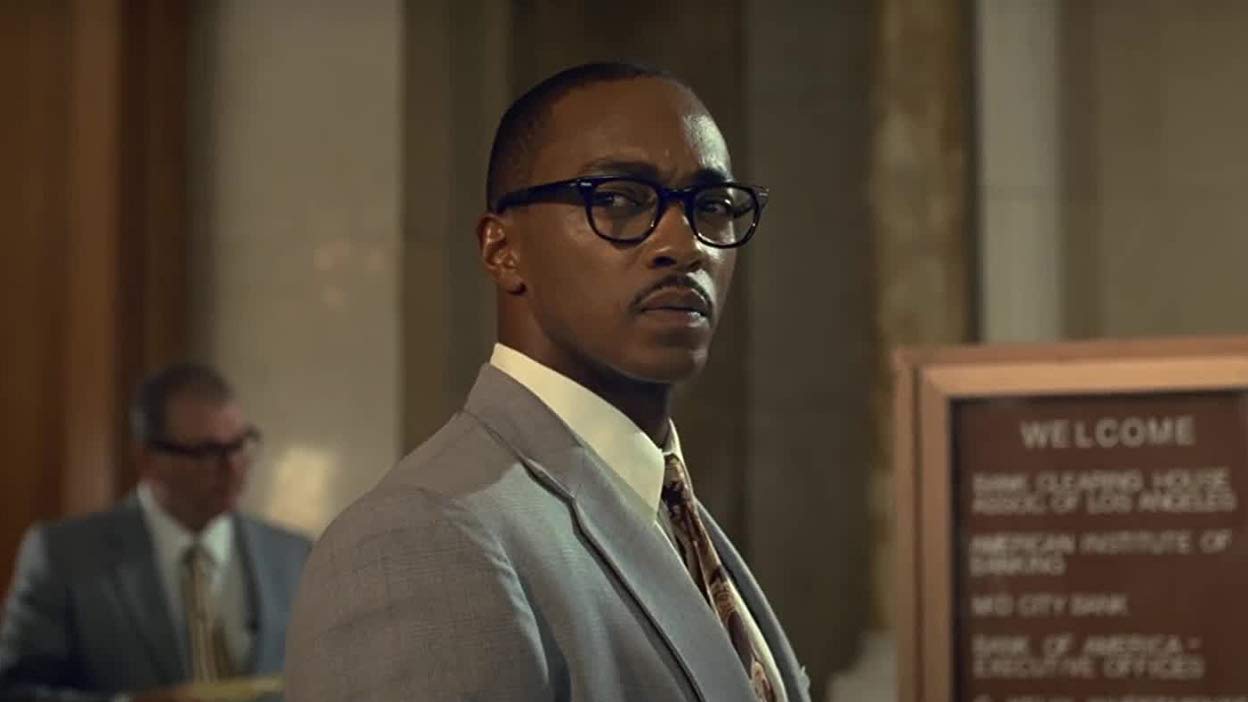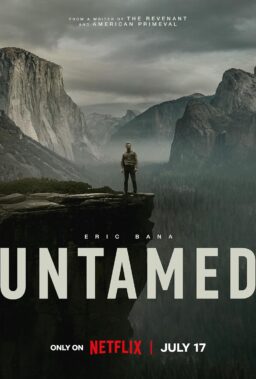“The Banker” sounded like it was going to be 2019’s “Hidden Figures.” Two “Avengers” stars played real-life black men who became wealthy real estate investors with vast properties by telling their white construction worker what to say so that he could pretend to be the president of their company. But controversy unrelated to the quality of the film became a distraction that derailed some of the marketing for the film, and its quieter release to Apple TV+ has made it harder for the film to find its audience.
In an interview with RogerEbert.com co-writer/director George Nolfi talked about the eight hours of taped interviews with the real-life Bernard Garrett (played in the film by Anthony Mackie), taking the MasterClass on directing from Samuel L. Jackson (who plays Joe Morris), making property valuation and bank loans cinematic, and how “The Banker” is both a heist film and a “My Fair Lady” story.
I’m guessing that until you started working on this movie, you never really thought much about banks. Is that right?
[Laughs] That’s mostly right. I would say, because I studied a lot of economics and political science, I certainly was familiar with the importance of the movement of capital into businesses and into private hands, and the way that allows the economic engine to go, society-wide as well as with individuals, being able to start businesses and buy houses. As to the specifics of the arcana of banking laws and also of property valuation, that was all stuff that I had to go and talk to experts about, and then get back into my math brain and figure out how all that stuff worked.
Well, that’s step one. Step two is: how do you make that cinematic?
I was concerned when I first heard the story. Let me take a step back and tell you how I first heard about the story. I was making “The Adjustment Bureau.” We’d finally saved up the money to get to the top of Rockefeller Center to shoot the end of the movie, and Joel Viertel, a friend of mine who was basically the on-set editor on that project, pitched the story, the real-life story to me and to Anthony Mackie. And we were both so amazed at what these guys accomplished, and we also felt like there was this incredible, unusual, really unique sort of hook where you reverse all the stereotypes and you have these two amazing African-American men, despite all the racism around them, My Fair Lady-ing, as it were, a white guy to be their front. We felt, right then and there we just kinda looked at each other and said: “OK, what can we do to help get this made?” In that same moment, I had a shiver down my spine of like– it’s about banking and real estate! Not exactly the most cinematic things that there are.
It took several years. I had to finish “Adjustment Bureau” and then I went and did a TV show for a while that I created and so forth, and by the time I came back to it, I had been turning it over in my head for a long time. The more I thought about it, the more important I thought it was to try with every tool that I had to not dumb down the banking and real estate, and to create a movie that showed really what these guys did. Because the reality of most of the jobs and most of the wealth in America is that they’re not accumulated in cinematic ways. I felt it was extremely important to tell a story, very closely based on facts, about two African-American men succeeding using only their brains, despite racism around them, having fun doing it, and the movie had to be fun watching them do it.
It’s almost a heist film isn’t it?
That was the idea. The idea was to bring to bear the genre elements of a heist movie and the things that Hollywood does great in terms of production design and music and costuming and the look of the film, to bring all of those tools to bear to make that banking and real estate talk something that you can accept. You might say, “I don’t understand it in the moment, but I know these guys understand it.”
At the last screening I did before the corona epidemic shut all that down, an African-American woman stood up to say: ‘thank you for giving us our very own ‘Ocean’s Eleven.” And I was like, “That’s the best compliment I could possibly have.” But I corrected her and said “Ocean’s Twelve,” because that’s one I wrote [laughs]. But that’s what I was trying to do.
I feel like white people take for granted that Hollywood will make movies that glamorize them with all the tools that Hollywood has, that glamorize the way they outsmart a system or a person who has vast resources. That’s what the “Ocean’s” movies are. I felt like—show me the movie that has African American protagonists that does that, instead of the usual focus on misery.
One thing that I thought was very insightful was acknowledging Bernard’s anger, because he doesn’t show it.
That is what I felt from listening to the eight hours of tapes with Bernard—you get much more so by actually listening to them than by reading the transcripts of them. He does actually talk about it to some extent. He absolutely had made a choice in his life. He looked around and he said, “I’m not going to beat the racist system, I’m not going to change the world, but what I can do is keep my head down, effectively not challenge the white power structure in a direct way, and use my smarts to succeed. I have a steeper climb, but I have the tools to make that steeper climb and make it to the top.”
That seems to be his attitude in some of the things he said, and also the way that he said them. Then it is clear that when he got arrested, and called before Congress that there was a transition in his thinking, to where he thought: “I was wrong. I was too sanguine about the possibility of just keeping my head down and succeeding in a society that has this much structuralized racism in it.” So that’s the transition that I wanted to dramatize in the movie. I felt that that was a transition that he went through in the part of his life that we were dramatizing, which was fundamentally up to him going to prison. That’s what I would say, I just think that’s who he was. Let me just say, just to come back to the anger, I think he kept his anger in check, and when you listen to the tapes, it comes out when he feels like he’s given too much credit to the ability that he can survive in this system. And how much Joe had to do with bringing that out is– you’re sort of trying to read between the lines of what he’s saying, because we don’t have an interview with Joe, but it does seem clear that Joe was a person who understood the ways of the world, and he was incredibly politically savvy. That’s where that dynamic came from.
That existed to some extent in the original script, because there was a script written 25 years ago, several drafts of that script. But I wanted to bring that out when I revised it with Niceole Levy. It’s also worth noting that my three co-writers on the script are all African-American, and we had multiple producers who are African-American including Sam Jackson and Anthony Mackie, who’s been involved from the very beginning of my involvement with it.

As often happens with real-life stories, there have been some complaints that you did not include all the facts.
Many of the claims that were made about the movie not being based on reality, that we were manipulating the facts, are just false. And they’re provably false. And it has been very difficult for me as a filmmaker to sit back and hold my fire. It hews very closely in the first part of the movie, up to the idea to buy the Banker Building almost exactly to what happened to him as he described it. All the stuff about Barker (the white investor who helped Garrett, played by Colm Meaney), Barker dying, Barker’s wife, the guy in the wheelchair, the lawyer helping them, all that is just exactly what happened.
And then we also have an 1,100-page US Senate hearing where Bernard is interviewed under oath, Joe is questioned under oath, Matt is questioned under oath, and multiple federal officials, including the ones who show up at the end, like Norman Dunn, Comptroller of the Currency for the Southern District, gives sworn testimony under oath. We also have 40 or 50 legal documents about the Banker Building and other properties that they owned, notarized legal documents from the County Recorder’s offices of where the property was owned. We have court cases, unimpeachable sworn testimony, and notarized legal documents, contemporaneous, filed with the county recorder.
Did we dramatize things? Of course. Any movie “based on a true story” does that or it would be the most boring movie ever made. Or it would be called a documentary. Did we take more liberties in what we dramatized than “Hidden Figures,” for example? Or “Argo“? Or “BlacKkKlansman“? All of which I personally loved. Absolutely not.

Did you really watch Samuel L. Jackson’s MasterClass? And if so, what did you learn?
I did! So I had not met him before we started shooting. Anthony Mackie—this is what producers do—Anthony Mackie had emailed him, texted him, called him, whatever, and said: “You know what? We’ve known each other for a long time. This is the one I want you to do with me. Will you please read this script.” And it was Anthony calling Sam that got Sam to read it quickly, and got Sam to say, “All right, you’ve worked with the guy, so I approve him as a director.” So, then I first met Sam the night before we started shooting. I had no time to rehearse. It’s very tricky; these guys are so busy.
Day one or two, I’m in Sam’s trailer talking to him about what’s coming for the day, and he says, “Have you seen my MasterClass?” And I was like, “Um, no.” And he was like, “Oh, you’ve got to see my MasterClass.” So I looked through the ten or so chapters, and one of the chapters is him talking about directors. I just go straight to the directors chapter, and he’s so harsh. He’s like: “There are shooters, and they’re basically guys that love the camera and have been shooting music videos or whatever, and they’re fine because you just do your thing and they do their thing and that’s that, and then there are people who are lucky to be there—and that’s most of them.” And he proceeds to just say: “All these idiots have gotten an opportunity to direct for one reason or another.” And then, he says, “There are writer directors, and they’re an interesting lot, because they understand their script; they can really help and whatever.”
So it was daunting because he was very much like: “Look, the director can do his thing and kinda suck at what he’s doing, and I’m gonna do my thing, and that’s that. But if there’s somebody who comes to the table prepared, and really knows the material, then we can have a conversation.” So I went in the next day and I was like: “Uh, which category do I fall into?’
And I’m sure he was honest with you.
“Oh,” he said, “Too early to tell.” [laughs]












